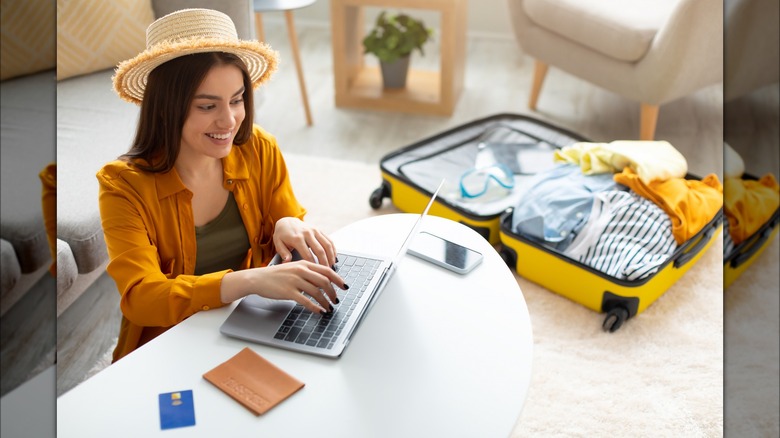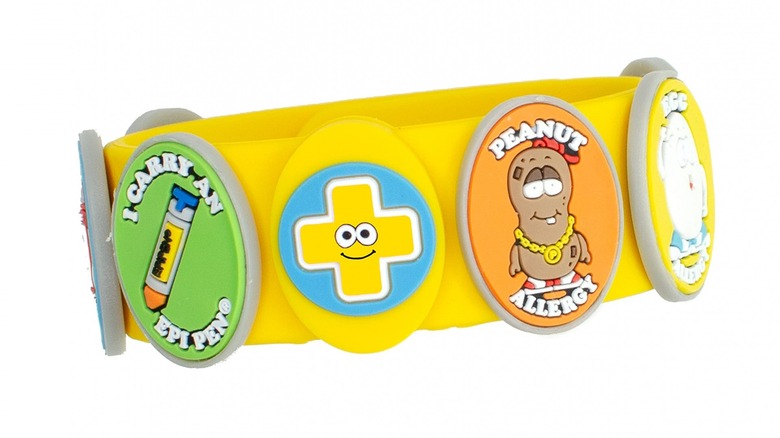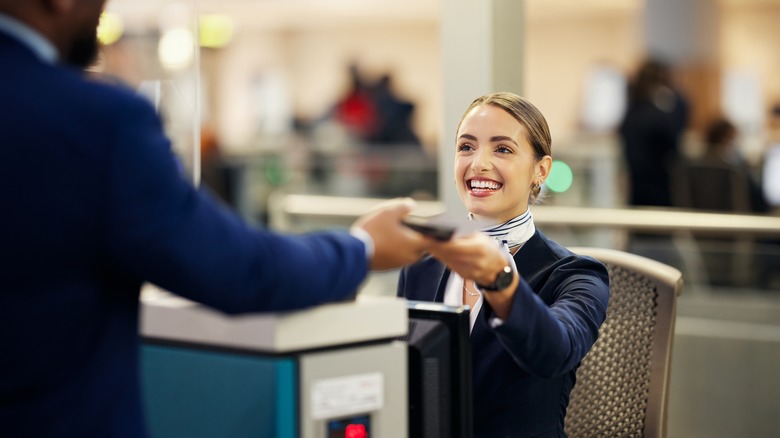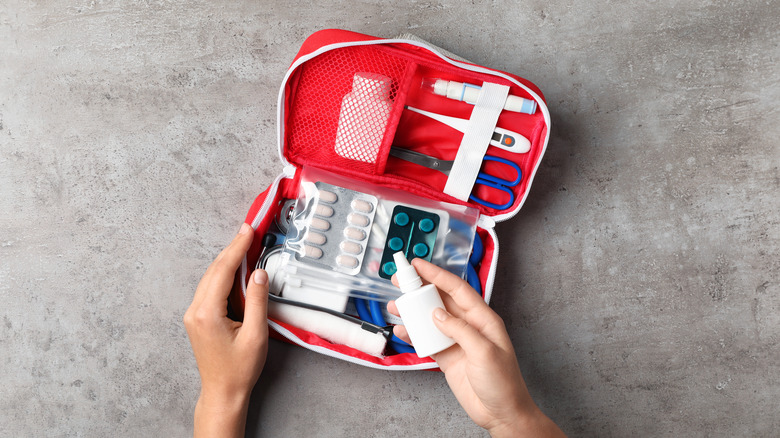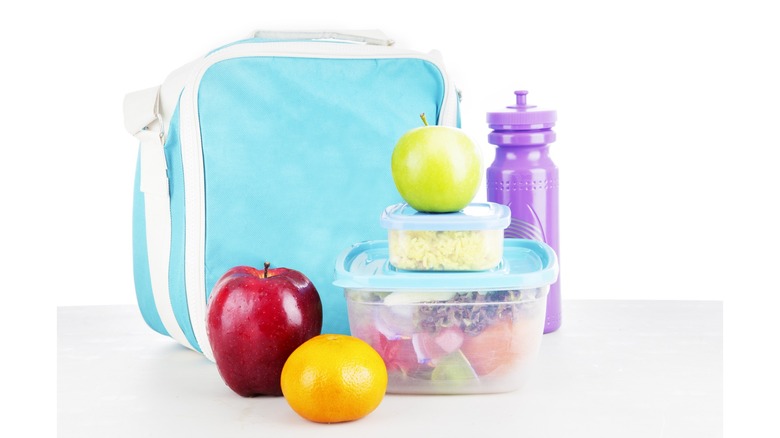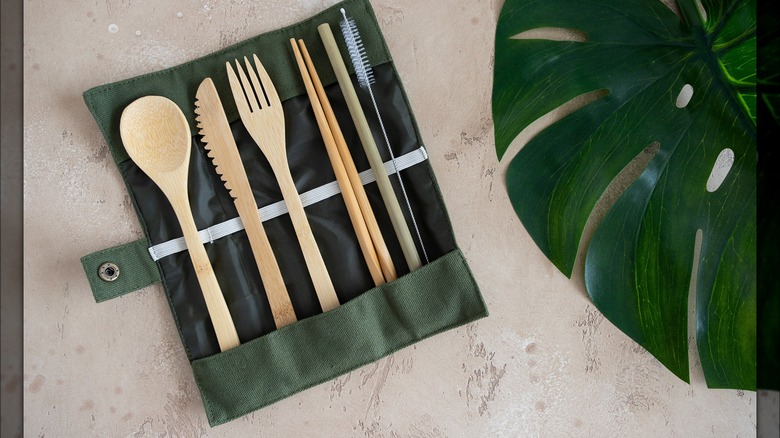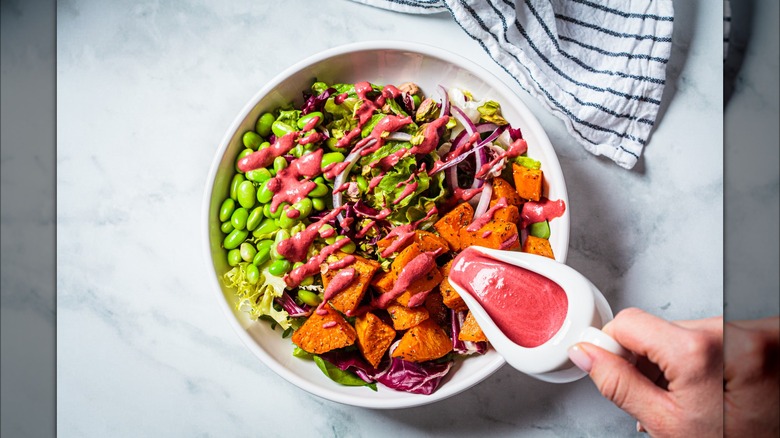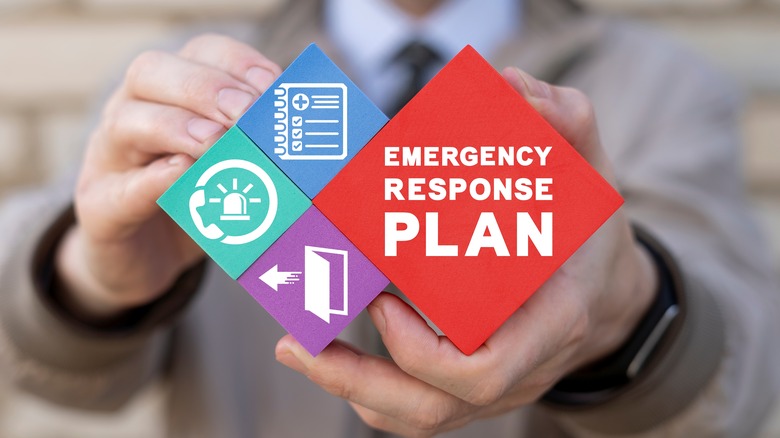What To Know Before Traveling With Food Allergies
We may receive a commission on purchases made from links.
Do you worry about traveling with food allergies? At home, you have your routine. You know how to avoid certain foods, and if you have an allergic reaction, you have a protocol to keep you safe. But when traveling, all that goes out the window. You're in a new environment with new food and potentially even a different language. This is half the fun of traveling — but if you have food allergies, it can also cause anxiety.
According to the Allergy and Asthma Foundation of America, about 6% of people in the States have at least one food allergy. Of these allergies, there are nine main offenders: milk, eggs, fish, crustacean shellfish, tree nuts, peanuts, wheat, soybeans, and sesame. In the U.S., food labels must list these common allergens. Unfortunately, not all foreign countries are required to do the same — and even Stateside, things often slip between the cracks.
What does all this mean for allergy-prone travelers? Well, whether you have a severe or mild allergy, it can impact your overall experience. However, we wouldn't let that stop you from traveling altogether. With the right preparation and knowledge, you can have an amazing trip without issues. So, if you're planning that upcoming vacation, here are 12 things to know before traveling with food allergies.
Choose the right destination for you
When it comes to planning a travel itinerary, analysis paralysis can hit hard. Where do you go, and which new foods will you try? This is where your allergies can be a blessing in disguise. It can help you narrow down the right destinations...because some places are easy for allergy-prone individuals, while others aren't familiar with allergies at all.
It's crucial to research the cuisine where you're headed. Find out the region's typical dishes and look up the ingredients in each. For example, Thailand is great if you're dairy-free, and you'll have plenty of soups, noodle dishes, and curries to choose from. However, it can be difficult with a peanut allergy since this ingredient is widespread. And if you have a bad reaction to fish, a beachside destination known for its seafood might not be ideal.
If you like to plan, you probably shortlist some top restaurants in advance. It's unlikely you'll hit them all, so choose the ones with the right menu for you. If you're avoiding dairy, vegan restaurants are found in most major cities, and many gluten-free establishments are popping up, too. In your research, you also might stumble upon local dishes that you can't wait to try...getting you even more excited about that upcoming trip. But remember that regardless of where you travel, not all restaurants use the same recipes, so you should still inform staff of dietary restrictions.
Wear a medical ID accessory
Medical ID jewelry states what you're allergic to and any medications you're on. If time is of the essence, this accessory can be lifesaving. Let's say you have a severe peanut allergy, and peanuts unexpectedly slip into the dish you're consuming. You might go into anaphylactic shock before you can communicate what's happening. Those around you might not understand what's going on or how to react. Fortunately, first responders are trained to look for these identification accessories. So, when you can't do the talking, let medical ID jewelry do it for you.
Medical ID jewelry can also provide a huge relief to parents. If your child has allergies, the struggle is real. Kids aren't always as cautious about what they consume as they should be, and it can be hard to let them leave your sight while traveling. But if your cruise ship has a kids' club, your children might want to join. Medical ID bracelets or necklaces can give you the peace of mind to let them break free for a while.
If you're not a jewelry wearer, don't be discouraged. Nowadays, these bracelets and necklaces come in different styles. Whether you prefer a classic gold chain or a simple silicon band, you've got options. And if you're still not convinced, know that iPhones can serve a similar function. Enter any related medical information into the Health app, which is easily accessible in emergencies without a password.
Stock up on prescriptions
Before you set off on an adventure, stock up on all prescription medications. You might not have access to refills, depending on where you're going — and even if you have enough to get by, we recommend getting more. You might pride yourself on your minimalistic packing skills, but when it comes to prescriptions, it's better to err on the side of caution. Travel delays and flight cancellations happen all the time, and your trip might be unexpectedly extended.
If you're not due for a refill, you might wonder if getting more meds is possible. Luckily, the medical system can be pretty accommodating if you go about things correctly. Let your doctor know your travel plans, and they might be able to prescribe medications in advance.
If you rely on insurance to foot the bill, there's a little something called vacation override. The frequency at which you can use an override depends on your insurance company and pharmacy. On Reddit, one pharmacy technician explains that "a lot of insurance plans allow one vacation override per calendar year/12 months. As long as there's not a post date (do not fill until x date), we can usually get one put through early."
Contact the airline in advance
For some people, flying already provokes anxiety, and adding food allergies into the mix only makes the situation worse. One way to lessen the stress is to be proactive. Call the airline two to three days in advance, inform them of your allergy, and ask how they can accommodate your needs. The FAA doesn't have one policy regarding allergies, so it really depends on the airline and flight attendants you're dealing with. Some might be happy to serve nut-free snacks, while others may allow you to change seats upon request.
When you contact the airline, you can also ask about its preboarding procedures. According to a 2019 Department of Transportation ruling, individuals or parents of children with severe allergies are allowed preboarding or additional time to be seated to wipe down the seating area. Unfortunately, not all airlines consistently uphold this regulation, so it's important to advocate for yourself. If you need additional time due to allergies and hear that preboarding announcement, assume it includes you. This is where the advice "ask forgiveness, not permission" comes into play — and in this case, it's entirely within your rights to board that plane early.
Learn the local lingo
We all know the type: Americans who land in a foreign country and immediately ramble on in English to everyone they encounter. Many locals try to be accommodating, and English signage might be the norm in touristy destinations. But when traveling internationally, a little effort goes a long way. Learning the local language can not only help you show respect and connect with locals; it can help you communicate your needs. And if you're dealing with a severe allergy, that effort can prevent a dietary disaster.
You'll need to engage with the staff at restaurants, hotels, and tour companies. Worst-case scenario, you'll need to communicate effectively with medical personnel. Knowing some key phrases related to your food allergies is essential. And if you want staff to pay attention to you, show them some respect first. Why not butter them up with some local greetings? Trust requires building rapport, and when you start off on a friendly foot, people will be more willing to help and listen to your needs.
Bring a medical kit in your carry-on
Has an airline ever lost your checked luggage? If so, you know how crucial it is to keep your most necessary items on hand. It's one thing to wear the same outfit for days on end — it's another to suffer an allergy attack without meds. And as any avid globetrotter knows, organization is everything. We recommend storing all your health-related items in a medical kit in your carry-on.
This kit is convenient for holding epinephrine autoinjectors, digestive supplements, or antihistamines. But why stop there? Put this carry-on kit to good use by stocking up on items for other common medical emergencies and travel health. Think aspirin and other pain relievers, melatonin, or food poisoning and motion sickness remedies. And if you're planning any active endeavors, consider some bandages and disinfectant to clean wounds.
To comply with TSA regulations, all liquids must be in 3.4-ounce (100 ml) or smaller containers and fit into a transparent quart-sized bag. Also, carry all medicine in its original bottles alongside the prescription and dosage information. Immigration control rarely asks for such proof, but it's better to be safe than sorry.
Prep snacks ahead of time
Have you ever gotten hungry on a long-haul flight? When hunger strikes, it can quickly turn to hanger if not managed appropriately. Food allergies only complicate this. Imagine being stuck on a plane only to realize the meal you requested isn't available — and all other options don't suit your dietary needs. Do you bite the bullet and take the risk? Even with minor allergies, you might quickly regret this decision. Instead, come equipped with your own snack pack.
We suggest bringing plenty of snacks for the airplane and some non-perishable foods to last the trip. Think jerky, fruits, energy bars, and a reusable water bottle. Of course, any produce or animal products will be confiscated when landing in foreign countries, so gobble those up on the way there. And remember, TSA allows solid food on flights but limits liquids or gels to 3.4-ounce containers. Exceptions are made for breast milk, baby formula, and baby food, but give the TSA officer a heads-up at the beginning of your screening. It'll help the whole process move more swiftly, and when flying with small children, all travel hacks are welcomed.
Carry your own utensils and disinfectant wipes
Whether on a plane or at a restaurant, those who came before you may not have been the tidiest of individuals. Perhaps they left a trail of crumbs or a slathering of sauce. Even without allergies, we'd want a clean surface before chowing down. This is exactly why travel-friendly disinfectant wipes, like these Clorox To-Go Wipes, come in handy.
Travel wipes are an excellent way to keep other surfaces clean as well. If you're worried about the sanitation of that hotel room desk or bathroom counter, bust out a wipe and give it a once — or twice — over. You'd be surprised just how dirty airplanes can be, so we'd hit up any high-traffic contact points, like armrests, seatbelts, and seatback pockets.
If you want to upgrade your food hygiene even further, bring your own utensils. Although cross-contamination is more likely to happen in the kitchen than on your plate, taking cutlery into your own hands couldn't hurt. And with your own reusable set of chopsticks, cutlery, and straws, you'll also cut back on environmental waste.
Make food allergies known when dining out
In your hometown, you probably have your go-to restaurants. The waitstaff knows you and is already aware of your dietary needs. You likely have a few tried-and-true dishes and know exactly how you react to the restaurant's food. But when traveling, you exchange these creature comforts for the unknown. And while trying new restaurants can be exciting, it comes with some risks. To lower these risk factors, make your food allergies known when dining out.
One easy way to do this is by creating a chef card. Although it resembles a business card, these small cardstock papers explicitly list your allergies or food intolerances, so you don't have to. Make sure to carry enough of these to hand out to waitstaff, or laminate one so you can reuse it. If you're traveling internationally, print them in the local language. You wouldn't want to tell your server about your allergies and then anxiously await a game of telephone as they relay it to the kitchen. Instead, a chef card can be handed directly to the chef, preventing anything from being lost in translation.
It's also a good idea to ask how restaurants cook their food. Cross-contamination is a common issue in the food service industry and can lead to nasty after-effects. Those with sensitive gluten intolerance may want to steer clear of any food fried in the same cooking oil as breaded products. If possible, ask that your meal be cooked separately.
Read the ingredient labels on packaged foods
Thank goodness for food labels. When out and about, you can buy a prepackaged snack, flip it over, and read that ingredient list, avoiding any foods you have bad reactions to. For particularly sensitive individuals, labels even include warnings about potential allergens processed in the same manufacturing facilities. However, not all countries have the same guidelines and preventative measures regarding food labeling.
The States and many highly developed countries follow the Codex Alimentarius for international food standards. They require food labels to clearly state common allergens, including nuts, milk, eggs, and wheat. Some countries even go as far as labeling foods high in sugar or calories. If you're in a country that follows similar packaging standards, always read the fine print — and if it's in another language, use a translation app. Google Translate can use your camera to detect the language and automatically translate it to English. It can't get any easier than that!
Unfortunately, some countries are far more lax in the labeling department. And if you're buying from independent vendors, packaged products might not have labels at all. Exercise some common sense, and give it a pass if the ingredients aren't obvious.
Be extra careful with sauces
Sneaky ingredients can make their way into sauces. In South Korea, it's not uncommon for salad dressings to contain fruits like kiwi or strawberry, and Korean chili paste (gochujang) and soybean paste (doenjang) are known to contain gluten.
Although you might not think of Japan as a peanut-happy country, these legumes hide where you'd least expect. One Reddit user experienced this issue firsthand when traveling in Japan: "I found out (the hard way) that [peanuts] can be used in salad dressings, ramen broths (like tantan men), meat marinades, dipping sauces...and some types of tofu." To further complicate things, they explained that "[p]eanut and nut allergies are rare there, so it's not always or often listed on menus."
You might not taste it right away, but if you're allergic to an ingredient in the sauce, you'll feel that reaction soon enough. If it comes in a bottle, always read the nutrition label thoroughly. And if it's a restaurant's homemade sauce, ask ahead of time and make it known you have an allergy, not just a food preference. But whenever in doubt, forego the sauce altogether.
Have an emergency protocol for your destination
Even if you take all the preventative measures you can, unexpected situations can arise. Worst-case scenario, have a plan for emergencies. Not only will a backup plan give you peace of mind, but it can also get you out of a pickle.
Keep a list of important numbers handy, including your allergist. And wherever you're headed, look up the emergency numbers because it's not 911 everywhere! Aside from these phone numbers, it's essential to understand how medical systems work. Does this country have socialized medical care, or should you expect a hefty bill? If it's the latter, travel insurance can be a solid investment, especially if you're taking an unexpected trip to the ER.
Overall, looking at the map to get a basic lay of the land can improve your experience. How close is your hotel to the nearest pharmacy and hospital? Not only does understanding your surroundings help you feel safer when traveling, but it can also prove beneficial should things go awry.

